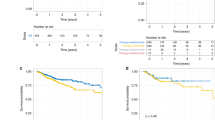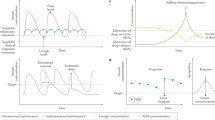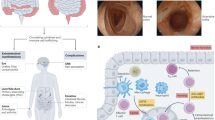Abstract
Several trials have shown that early treatment of Crohn's disease with immunomodulators and anti-TNF agents leads to a superior clinical outcome, including healing of the mucosa, compared with standard therapy alone. Mounting evidence indicates that mucosal healing is associated with a reduced risk of complications, and a reduced need for surgeries and hospitalizations. In the SONIC trial, a combination of the standard azathioprine immunomodulator therapy and infliximab, an anti-TNF agent, had more potent anti-inflammatory effects than either drug alone in patients with Crohn's disease who had evidence of active inflammation. These findings and those from rheumatoid arthritis trials have prompted the investigation of early initiation of immunomodulator (standard or anti-TNF) therapy for Crohn's disease, in suitable patients, which has led to substantial improvements in disease management. Careful selection of patients is, however, essential given the potential risk of toxic effects from these therapies and the fact that some patients with IBD will have a favorable disease course without them. Identification of suitable patients, however, remains a challenge, as genetic, phenotypic and environmental factors have not yet been identified that can be used for routine assessment and selection is mainly based on clinical criteria.
Key Points
-
In patients with active Crohn's disease who are naive to conventional immunomodulators or biologic agents, combination therapy induces better rates of clinical and endoscopic remission than monotherapy
-
Patients with Crohn's disease usually have a better response to biologic therapy when treatment is initiated earlier in the disease course
-
Clinical parameters can be used to predict an unfavorable disease course in Crohn's disease and thus to identify patients who should be treated more aggressively early on
-
As potent and combined immunosupression is possibly associated with more toxic effects than standard therapy, the benefit of aggressive treatment needs to be balanced against potentially severe adverse events
This is a preview of subscription content, access via your institution
Access options
Subscribe to this journal
Receive 12 print issues and online access
$209.00 per year
only $17.42 per issue
Buy this article
- Purchase on Springer Link
- Instant access to full article PDF
Prices may be subject to local taxes which are calculated during checkout
Similar content being viewed by others
References
Baumgart, D. C. & Carding, S. R. Inflammatory bowel disease: cause and immunobiology. Lancet 369, 1627–1640 (2007).
Baumgart, D. C. & Sandborn, W. J. Inflammatory bowel disease: clinical aspects and established and evolving therapies. Lancet 369, 1641–1657 (2007).
Munkholm, P., Langholz, E., Davidsen, M. & Binder, V. Disease activity courses in a regional cohort of Crohn's disease patients. Scand. J. Gastroenterol. 30, 699–706 (1995).
Munkholm, P., Langholz, E., Davidsen, M. & Binder, V. Intestinal cancer risk and mortality in patients with Crohn's disease. Gastroenterology 105, 1716–1723 (1993).
Rutgeerts, P. et al. Predictability of the postoperative course of Crohn's disease. Gastroenterology 99, 956–963 (1990).
Langholz, E., Munkholm, P., Davidsen, M., Nielsen, O. H. & Binder, V. Changes in extent of ulcerative colitis: a study on the course and prognostic factors. Scand. J. Gastroenterol. 31, 260–266 (1996).
Langholz, E., Munkholm, P., Davidsen, M. & Binder, V. Course of ulcerative colitis: analysis of changes in disease activity over years. Gastroenterology 107, 3–11 (1994).
Gupta, R. B. et al. Histologic inflammation is a risk factor for progression to colorectal neoplasia in ulcerative colitis: a cohort study. Gastroenterology 133, 1099–1105 (2007).
D'Haens, G. R. et al. Early lesions of recurrent Crohn's disease caused by infusion of intestinal contents in excluded ileum. Gastroenterology 114, 262–267 (1998).
Stange, E. F. & Travis, S. P. The European consensus on ulcerative colitis: new horizons? Gut 57, 1029–1031 (2008).
Eaden, J., Abrams, K., Ekbom, A., Jackson, E. & Mayberry, J. Colorectal cancer prevention in ulcerative colitis: a case-control study. Aliment. Pharmacol. Ther. 14, 145–153 (2000).
Travis, S. P. et al. European evidence based consensus on the diagnosis and management of Crohn's disease: current management. Gut 55 (Suppl. 1), i16–i35 (2006).
Mekhjian, H. S., Switz, D. M., Melnyk, C. S., Rankin, G. B. & Brooks, R. K. Clinical features and natural history of Crohn's disease. Gastroenterology 77, 898–906 (1979).
Ramadas, A. V., Gunesh, S., Thomas, G., Williams, G. T. & Hawthorne, A. B. Reduced Crohn's resections with increasing immunosuppressant use in a population-based Crohn's disease cohort in Cardiff [abstract]. Gut 58 (Suppl. 2), A26 (2009).
Greenstein, A. J. et al. Perforating and non-perforating indications for repeated operations in Crohn's disease: evidence for two clinical forms. Gut 29, 588–592 (1988).
Edwards, F. C. & Truelove, S. C. The course and prognosis of ulcerative colitis: part 1: short-term prognosis. Gut 4, 300–308 (1963).
Järnerot, G., Rolny, P. & Sandberg-Gertzén, H. Intensive intravenous treatment of ulcerative colitis. Gastroenterology 89, 1005–1013 (1985).
Yu, E. D., Shao, Z. & Shen, B. Pouchitis. World J. Gastroenterol. 13, 5598–5604 (2007).
Cohen, R. D., Brodsky, A. L. & Hannauer, S. B. A comparison of the quality of life in patients with severe ulcerative colitis after total colectomy versus medical treatment with intravenous cyclosporin. Inflamm. Bowel Dis. 5, 1–10 (1999).
Breedveld, F. C. et al. The PREMIER study: a multicenter, randomized, double-blind clinical trial of combination therapy with adalimumab plus methotrexate versus methotrexate alone or adalimumab alone in patients with early, aggressive rheumatoid arthritis who had not had previous methotrexate treatment. Arthritis Rheum. 54, 26–37 (2006).
Goekoop-Ruiterman, Y. P. et al. Clinical and radiographic outcomes of four different treatment strategies in patients with early rheumatoid arthritis (the BeSt study): a randomized, controlled trial. Arthritis Rheum. 52, 3381–3390 (2005).
D'Haens, G. et al. Early combined immunosuppression or conventional management in patients with newly diagnosed Crohn's disease: an open randomised trial. Lancet 371, 660–667 (2008).
Colombel, J. F. et al. SONIC: a randomized, double-blind, controlled trial comparing infliximab and infliximab plus azathioprine to azathioprine in patients naïve to immunomodulators and biologic therapy [abstract]. Gut 57 (Suppl. 2), A1 (2009).
Markowitz, J., Grancher, K., Kohn, N., Lesser, M. & Daum, F. A multicenter trial of 6-mercaptopurine and prednisone in children with newly diagnosed Crohn's disease. Gastroenterology 119, 895–902 (2000).
Candy, S. et al. Controlled double blind study of azathioprine in the management of Crohn's disease. Gut 37, 674–678 (1995).
Schreiber, J. F. et al. Recent onset Crohn's disease shows higher remission rates and durability of response to treatment with subcutaneous monthly certolizumab pegol: results from an analysis of the PRECiSE 2 Phase III Study [abstract]. Gut 55 (Suppl. 5), A131 (2006).
Schreiber, S. et al. Early Crohn's disease shows high levels of remission to therapy with adalimumab: sub-analysis of CHARM [abstract]. Gastroenterology 132 (Suppl. 2), A147 (2007).
Froslie, K. F., Jahnsen, J., Moum, B. A. & Vatn, M. H. Mucosal healing in inflammatory bowel disease: results from a Norwegian population-based cohort. Gastroenterology 133, 412–422 (2007).
Kugathasan, S. et al. Mucosal T-cell immunoregulation varies in early and late inflammatory bowel disease. Gut 56, 1696–1705 (2007).
Baert, F. et al. Mucosal healing predicts sustained clinical remission in early Crohn's disease [abstract]. Gastroenterology 134 (Suppl. 1), A640 (2008).
Rutgeerts, P. et al. Comparison of scheduled and episodic treatment strategies of infliximab in Crohn's disease. Gastroenterology 126, 402–413 (2004).
Louis, E. et al. Infliximab discontinuation in Crohn's disease patients in stable remission on combined therapy with immunosuppressor: interim analysis of a prospective cohort study [abstract]. Gut 57 (Suppl. 2), A66 (2008).
Van Assche, G. et al. Magnetic resonance imaging of the effects of infliximab on perianal fistulizing Crohn's disease. Am. J. Gastroenterol. 98, 332–339 (2003).
Regueiro, M. et al. Infliximab prevents Crohn's disease recurrence after ileal resection. Gastroenterology 136, 441–450 (2009).
Peyrin-Biroulet, L. et al. Azathioprine and 6-mercaptopurine for the prevention of postoperative recurrence in Crohn's disease: a meta-analysis. Am. J. Gastroenterol. 104, 2089–2096 (2009).
Hellers, G. et al. Oral budesonide for prevention of postsurgical recurrence in Crohn's disease. The IOIBD Budesonide Study Group. Gastroenterology 116, 294–300 (1999).
Sands, B. E. et al. Infliximab maintenance therapy for fistulizing Crohn's disease. N. Engl. J. Med. 350, 876–885 (2004).
Colombel, J. F. et al. Adalimumab for the treatment of fistulas in patients with Crohn's disease. Gut 58, 940–948 (2009).
Caprilli, R. et al. European evidence based consensus on the diagnosis and management of Crohn's disease: special situations. Gut 55 (Suppl. 1), i36–i58 (2006).
Feagan, B. A. et al. Randomized, placebo-controlled study to evaluate the efficacy of infliximab in combination with methotrexate for the long-term treatment of Crohn's disease [abstract]. Gastroenterology 134 (Suppl. 1), 682C (2008).
Aratari, A. et al. Early versus late surgery for ileo-caecal Crohn's disease. Aliment. Pharmacol. Ther. 26, 1303–1312 (2007).
Kennedy, E. D. et al. Azathioprine or ileocolic resection for steroid-dependent terminal ileal Crohn's disease? A Markov analysis. Dis. Colon Rectum 47, 2120–2130 (2004).
Triantafillidis, J. K., Nasioulas, G. & Kosmidis, P. A. Colorectal cancer and inflammatory bowel disease: epidemiology, risk factors, mechanisms of carcinogenesis and prevention strategies. Anticancer Res. 29, 2727–2737 (2009).
Reinisch, W. et al. Infliximab treatment for ulcerative colitis: comparable clinical response, clinical remission and mucosal healing in patients with disease duration <3 years vs >3 years [abstract]. Gastroenterology 134, A495 (2008).
Derijks, L. J., Gilissen, L. P., Hooymans, P. M. & Hommes, D. W. Review article: thiopurines in inflammatory bowel disease. Aliment. Pharmacol. Ther. 24, 715–729 (2006).
Beaugerie, L. et al. Lymphoproliferative disorders in patients receiving thiopurines for inflammatory bowel disease: a prospective observational cohort study. Lancet 374, 1617–1625 (2009).
Siegel, C. A., Hur, C., Korzenik, J. R., Gazelle, G. S. & Sands, B. E. Risks and benefits of infliximab for the treatment of Crohn's disease. Clin. Gastroenterol. Hepatol. 4, 1017–1024 (2006).
Lichtenstein, G. R. et al. Serious infections and mortality in association with therapies for Crohn's disease: TREAT registry. Clin. Gastroenterol. Hepatol. 4, 621–630 (2006).
Colombel, J. F. et al. The safety profile of infliximab in patients with Crohn's disease: the Mayo clinic experience in 500 patients. Gastroenterology 126, 19–31 (2004).
Blonski, W. & Lichtenstein, G. R. Complications of biological therapy for inflammatory bowel diseases. Curr. Opin. Gastroenterol. 22, 30–43 (2006).
D'Haens, G. Risks and benefits of biologic therapy for inflammatory bowel diseases. Gut 56, 725–732 (2007).
Beaugerie, L., Seksik, P., Nion-Larmurier, I., Gendre, J. P. & Cosnes, J. Predictors of Crohn's disease. Gastroenterology 130, 650–656 (2006).
Loly, C., Belaiche, J. & Louis, E. Predictors of severe Crohn's disease. Scand. J. Gastroenterol. 43, 948–954 (2008).
Sutherland, L. R., Ramcharan, S., Bryant, H. & Fick, G. Effect of cigarette smoking on recurrence of Crohn's disease. Gastroenterology 98, 1123–1128 (1990).
Franchimont, D. P., Louis, E., Croes, F. & Belaiche, J. Clinical pattern of corticosteroid dependent Crohn's disease. Eur. J. Gastroenterol. Hepatol. 10, 821–825 (1998).
Lichtenstein, G. R. et al. Factors associated with the development of intestinal strictures or obstructions in patients with Crohn's disease. Am. J. Gastroenterol. 101, 1030–1038 (2006).
Abreu, M. T. et al. Mutations in NOD2 are associated with fibrostenosing disease in patients with Crohn's disease. Gastroenterology 123, 679–688 (2002).
Henckaerts, L. et al. Genetic risk profiling and prediction of disease course in Crohn's disease patients. Clin. Gastroenterol. Hepatol. 7, 972–980.e2 (2009).
Alvarez-Lobos, M. et al. Crohn's disease patients carrying Nod2/CARD15 gene variants have an increased and early need for first surgery due to stricturing disease and higher rate of surgical recurrence. Ann. Surg. 242, 693–700 (2005).
Radlmayr, M., Török, H. P., Martin, K. & Folwaczny, C. The c-insertion mutation of the NOD2 gene is associated with fistulizing and fibrostenotic phenotypes in Crohn's disease. Gastroenterology 122, 2091–2092 (2002).
Büning, C. et al. Mutations in the NOD2/CARD15 gene in Crohn's disease are associated with ileocecal resection and are a risk factor for reoperation. Aliment. Pharmacol. Ther. 19, 1073–1078 (2004).
Ferrante, M. et al. New serological markers in inflammatory bowel disease are associated with complicated disease behaviour. Gut 56, 1394–1403 (2007).
Dubinsky, M. C. et al. Serum immune responses predict rapid disease progression among children with Crohn's disease: immune responses predict disease progression. Am. J. Gastroenterol. 101, 360–367 (2006).
Bewtra, M. & Lewis, J. D. Safety profile of IBD: lymphoma risks. Gastroenterol. Clin. North Am. 38, 669–689 (2009).
Author information
Authors and Affiliations
Ethics declarations
Competing interests
The author has acted as a consultant, received honoraria for lectures and received research support from the following companies: Centocor BV, Schering Plough, Abbott and UCB.
Rights and permissions
About this article
Cite this article
D'Haens, G. Top-down therapy for IBD: rationale and requisite evidence. Nat Rev Gastroenterol Hepatol 7, 86–92 (2010). https://doi.org/10.1038/nrgastro.2009.222
Issue Date:
DOI: https://doi.org/10.1038/nrgastro.2009.222
This article is cited by
-
Early Use of Biologics Reduces Healthcare Costs in Crohn’s Disease: Results from a United States Population-Based Cohort
Digestive Diseases and Sciences (2024)
-
Comparative effectiveness of second-line biological therapies for ulcerative colitis and Crohn’s disease in patients with prior failure of anti-tumour necrosis factor treatment
BMC Gastroenterology (2022)
-
Discovery and validation of mucosal TNF expression combined with histological score - a biomarker for personalized treatment in ulcerative colitis
BMC Gastroenterology (2020)
-
The shining DIAMOND for evidence-based treatment strategies for Crohn’s disease
Journal of Gastroenterology (2020)
-
Gut Bacterial DNA Translocation is an Independent Risk Factor of Flare at Short Term in Patients With Crohn’s Disease
American Journal of Gastroenterology (2016)



